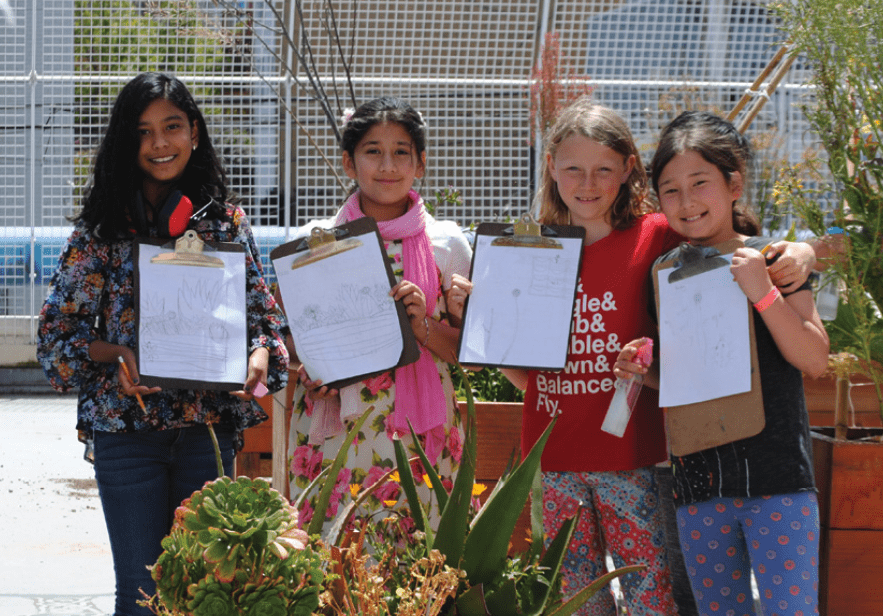Stories of Environmental Literacy from the Classroom
Listen to our podcast on all available podcasting apps in the Unites States.
Purpose and Overview
This podcast collection highlights stories of California TK-12 educators who teach reading, writing, listening, and speaking through the lens of environmental literacy and justice, giving a glimpse into what this type of work might look like in TK-12 classrooms.
As the state of California deepens efforts to include environmental literacy in all content areas, the California Environmental Literacy Initiative Professional Learning Hub’s English-Language Arts Working Group captured stories from the field to show examples of the benefits and power of this integrated model of instruction, which improves overall literacy skills in a number of important ways. It engages students with real-life issues of local and global significance about which young people genuinely care. It invites students to interact with the natural environment, not only through science content, but through multiple genres of literature and diverse writing tasks. Students are then empowered to think critically and creatively about solutionary action and effective forms of advocacy about environmental issues by providing an authentic audience to which students can speak and write.
In the elementary classroom in particular, integrating environmental literacy and English-Language Arts provides both efficiency and significant time-saving potential. Teaching English-Language Arts standards through the lens of environmental literacy and justice provides an important opportunity for all students to gain access to environmental learning, regardless of their school’s location.
For each superhero podcast, you will find:
- a short podcast teaser
- a full podcast
- a Snapshot of the episode
Based on the format of Snapshots in California’s ELA/ELD Framework, each one paints a picture of classroom practice, then explicitly lists the California Common Core State Standards for English, NGSS for California Public Schools (science standards), and Universal Design for Learning Guidelines, as well as the unit’s connection to California’s Environmental Principles and Concepts.
Credits: these podcasts and snapshots were created by CAELI members, Tara Kajtaniak, Cheney Munson, and Peggy Harte. Thank you for all of your work and support on this project!
Check out our recorded podcast launch party featuring our ELA Superheroes.
Watch here
Podcast Episodes (Series 2)
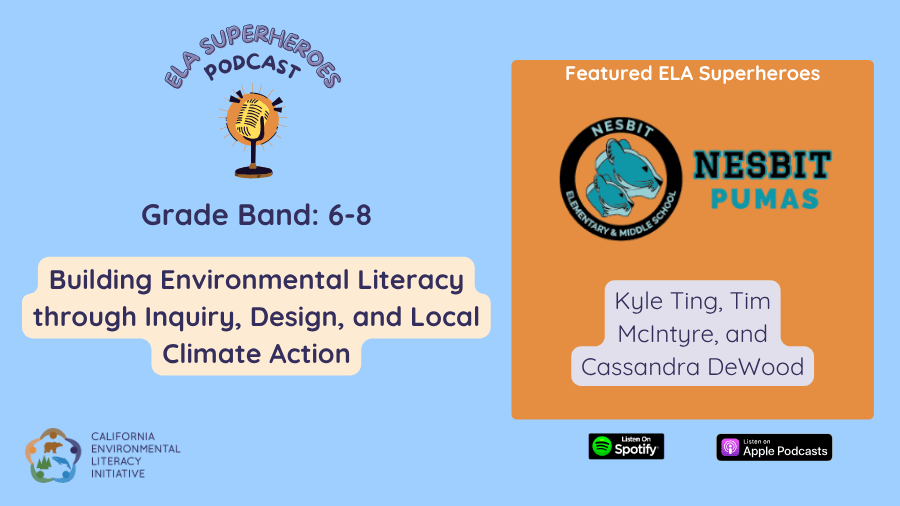
“We're not introducing them to something to be afraid of. We are demystifying and empowering them around something that they already know is happening.”
Tim McIntyre
This podcast episode explores how middle school teachers at Nesbit School integrate environmental literacy and solutionary teaching across disciplines. Sixth-grade ELA teachers Tim and Kyle, along with science teacher Cass, guide students in researching climate change, extreme weather, and other environmental challenges while developing practical solutions such as disaster preparedness kits and innovative technologies. The educators focus on empowering students to understand local environmental issues, engage with stakeholders, and take meaningful action—demonstrating how interdisciplinary, project-based learning can transform students from passive learners into active problem-solvers.
Featured ELA Superheroes:
- Kyle Ting
- Tim McIntyre
- Cassandra DeWood
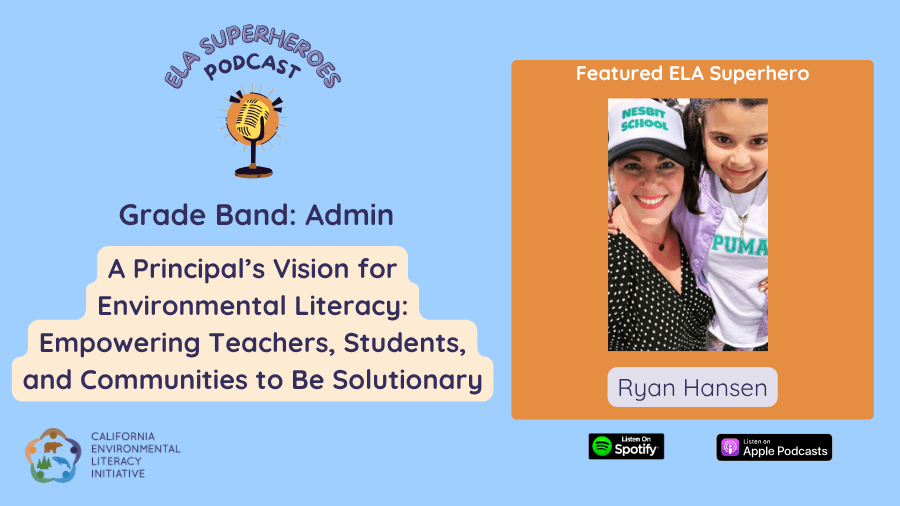
"When we moved to the solutionary approach, it was really about addressing engagement and academic rigor and giving kids those tools to spark them being the solutionaries, or like the problem solvers of real things in the community."
Ryan Hansen
The podcast features Ryan Hansen, principal of Nesbitt School, discussing how her K–8 school integrated environmental literacy and solutionary teaching across grade levels to increase student engagement and academic rigor. By providing teachers with resources, professional development, and funding, Nesbitt transformed its curriculum, enabling students to tackle real-world environmental challenges and develop critical problem-solving skills. This approach not only empowered students to make meaningful community impacts, but also reinvigorated teachers’ approach to learning and literacy.
Featured ELA Superheroes:
- Ryan Hansen
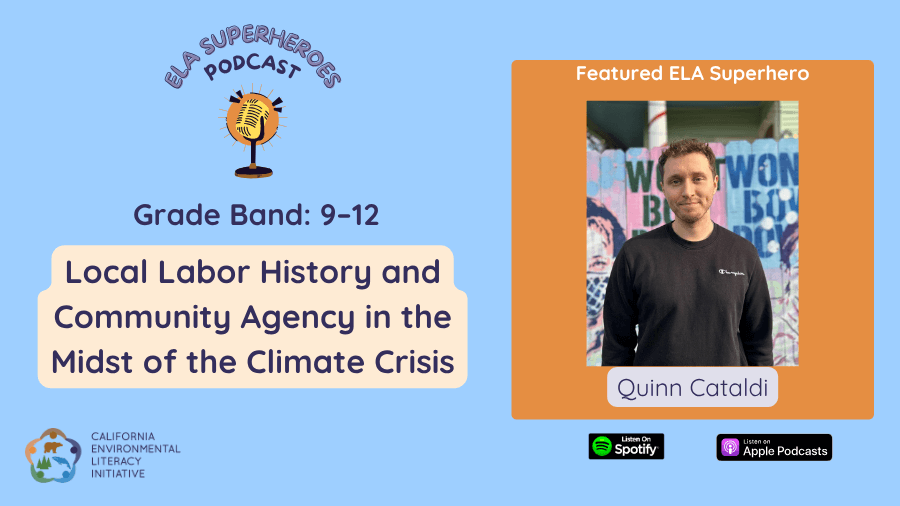
"We are trying to reenvision environmentalism as something in our day-to-day lives and interactions with each other. Watsonville is about people pushing back against systems of oppression which are destructive to the environment and to themselves as well."
Quinn Cataldi
In this podcast, Quinn Cataldi talks about his cannery unit in which his multilingual students learn about the intersections of the Chicano labor movement and social and environmental justice, specifically the ways in which the exploitation of the land and people are intertwined with legacies of colonialism. Students are then empowered to identify and write about equitable solutions that address systemic issues such as the climate crisis.
Featured ELA Superheroes:
- Quinn Cataldi
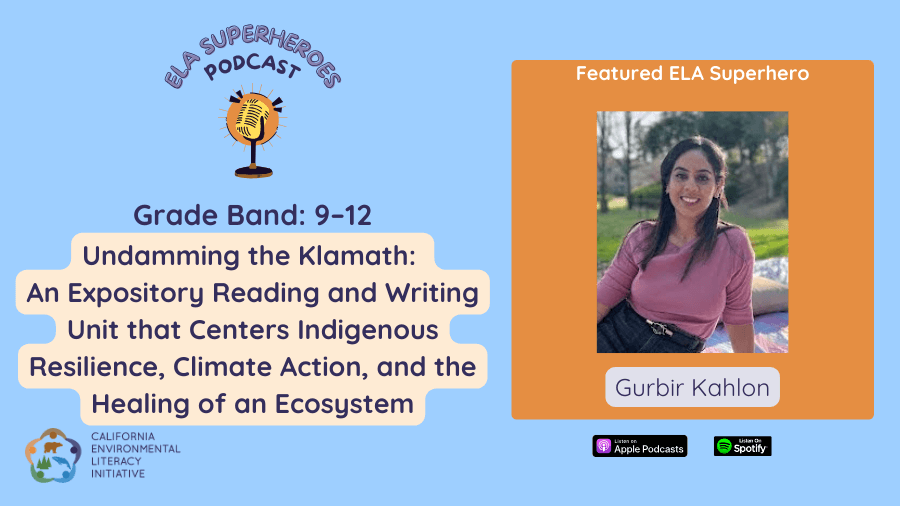
“Instead of focusing on a doomsday approach to teaching students, which heightens anxiety, I want to work to empower students and offer solutions.”
Gurbir Kahlon
Gurbir Kahlon engages her high school multilingual learners in Torrance, California, with important literacy skills through the lens of environmental literacy. She has taught units in her ELD classroom on biomimicry, plastic pollution, and climate change. In this podcast, Gurbir discusses her most recent expository reading and writing unit on the powerful story of the resilient tribal communities in Northern California and their successful efforts to remove dams on the Klamath River in order to welcome their salmon home.
Featured ELA Superheroes:
- Gurbir Kahlon
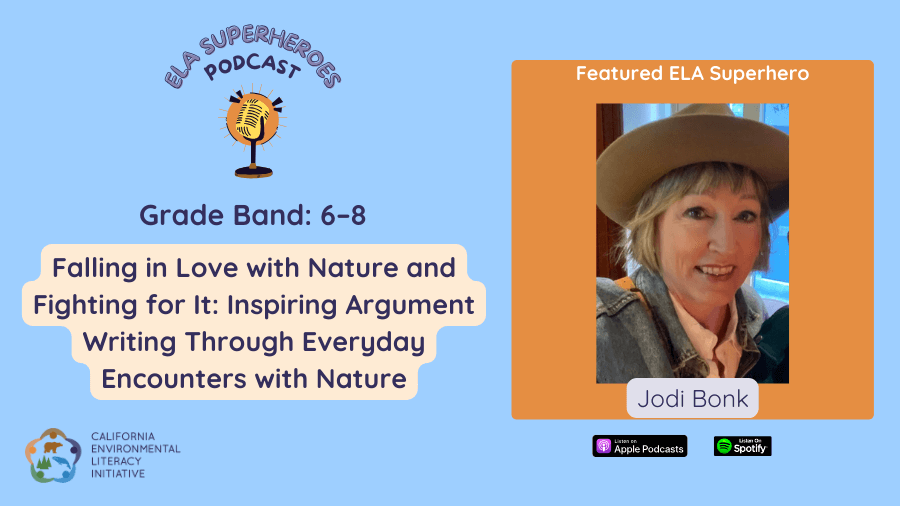
"When you’re talking about environmental justice, kids need to feel like they can do something. It needs to move to the place where they feel like they have power to make change."
Jodi Bonk
Jodi teaches sixth-grade English at Yorba Linda Middle School. As part of the California Writing Project Environmental Literacy and Justice Initiative, Jodi created and taught a unit that pairs wonder and nature writing with formulating opinions and argument writing. Her students first connect with nature through a variety of nature writing opportunities, then students use that connection to inspire both argument writing and artistic expression.
Featured ELA Superheroes:
- Jodi Bonk (she/her)

"Allow students to be curious and then come up with solutions to environmental justice problems. Integrating environmental justice into English/language arts makes students not only feel more engaged in their reading and writing but also feel they have the power to affect the world around them."
Lorena Sanchez
Lorena Sanchez is a teacher-librarian serving multilingual learners in grades TK-8 in Tracy Unified School District. Her deep STEM background and participation in the California Writing Project Environmental Literacy and Justice Collaborative inspired her to teach reading, writing, listening, and speaking through the lens of environmental literacy. This podcast features a lesson about a rotting pumpkin that leads students into rich ELA learning opportunities around plant life cycles, composting, and food waste mitigation.
Featured ELA Superheroes:
- Lorena Sanchez (she/her)
Podcast Episodes (Series 1)
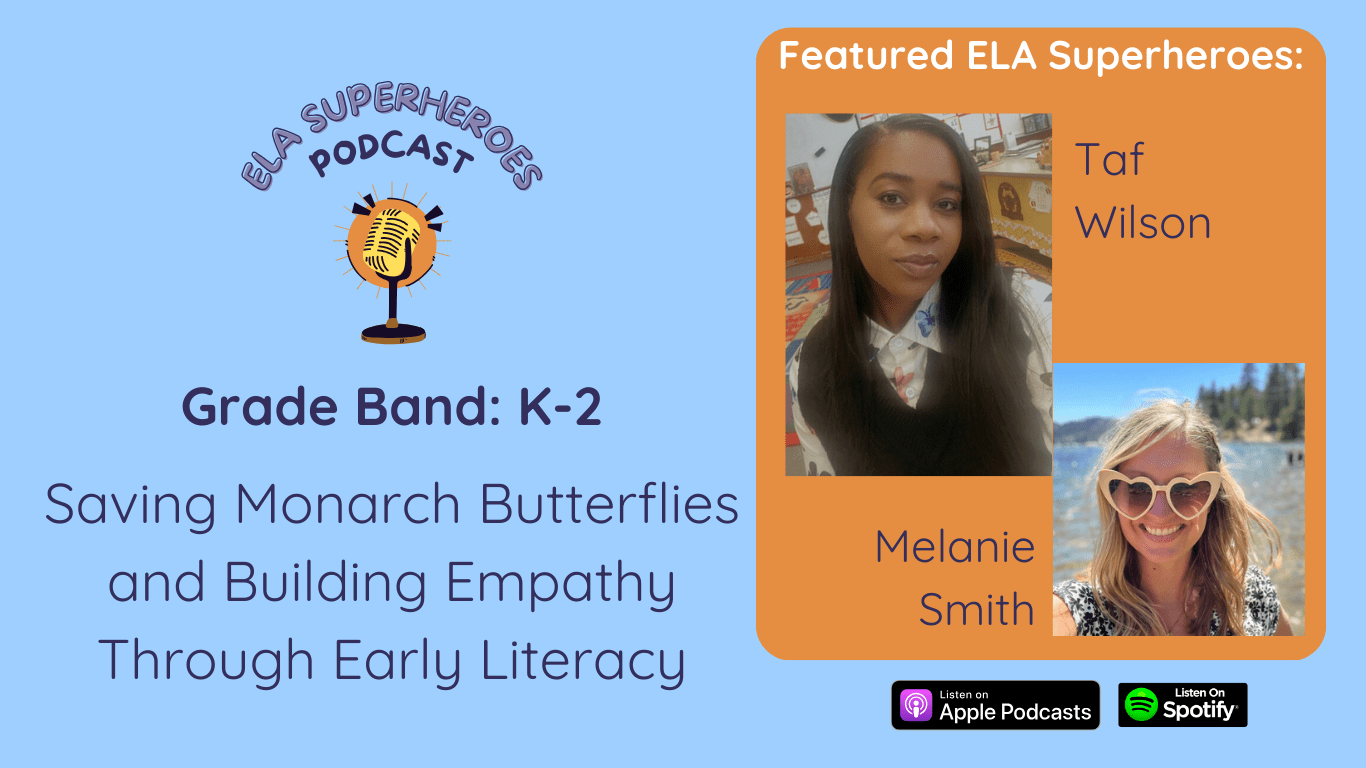
“If you give a problem to Kindergartners, they want to take it to the world, and they need everyone to come help them.”
Taf Wilson
At Golden Charter Academy, a public TK-5 school in Southwest Fresno, California, Kindergartners advocate for and participate in milkweed restoration in critical monarch habitat, thanks to their teachers Taf Wilson and Melanie Smith. In this interview, you will hear Taf and Melanie talk about their monarch butterfly unit and the ways they engage their students with reading, writing, listening, and speaking while saving butterflies in a project that began with a published curriculum unit and is evolving into a city-wide movement.
Featured ELA Superheroes:
- Taf Wilson (she/her)
- Melanie Smith (she/her)
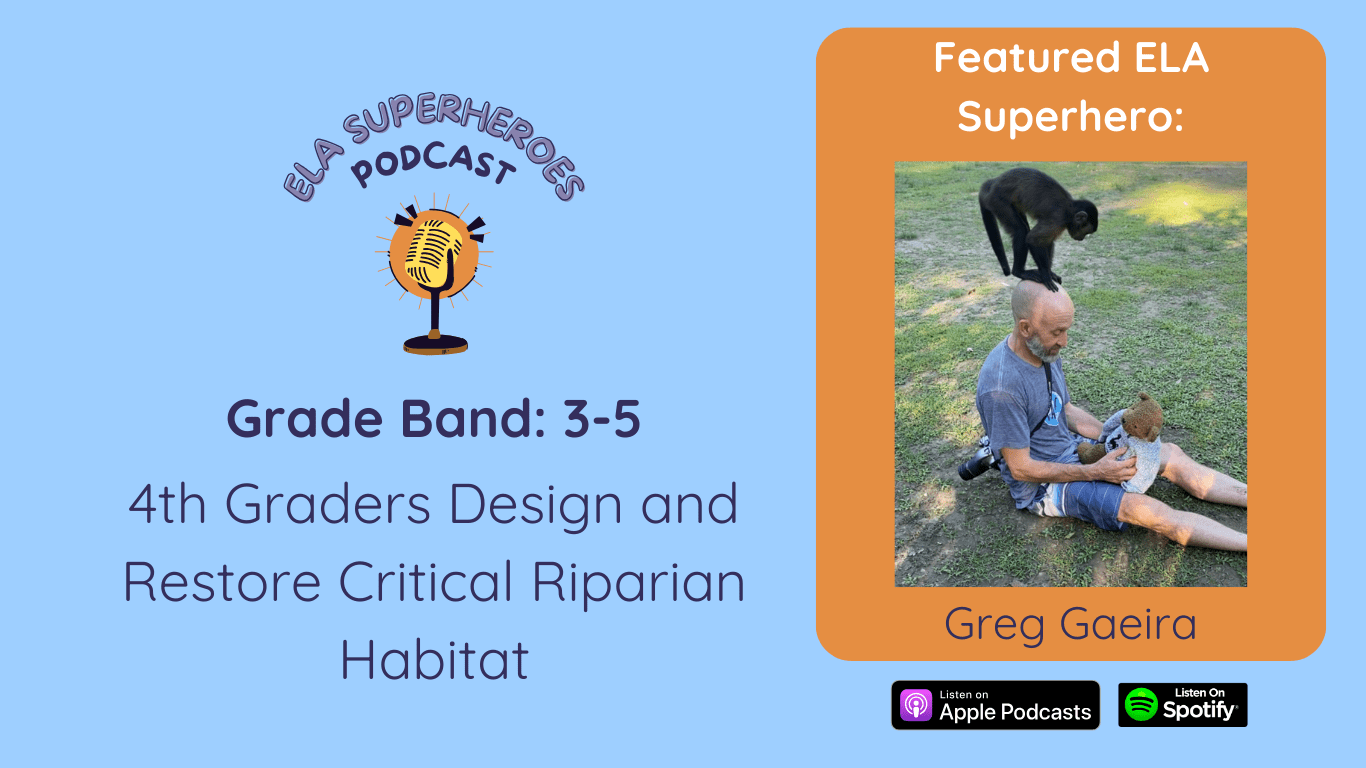
“It’s a powerful way to tie kids to the land…We are part of this land, and we are expected to care for it.”
Greg Gaeira
Greg teaches reading, writing, listening, and speaking to his 4th graders at Union Street Charter School, a public rural elementary school in Humboldt County, California. He simultaneously gets students outside and lets them get their hands dirty. His ongoing local land restoration unit, in partnership with a land trust and a native plant nursery, asks students to research native flora, use database evidence and expert advice to justify and present their choices for the most beneficial and appropriate native plants for the project, write a grant, and then complete the restoration project.
Featured ELA Superheroes:
- Greg Gaeira (he/him)
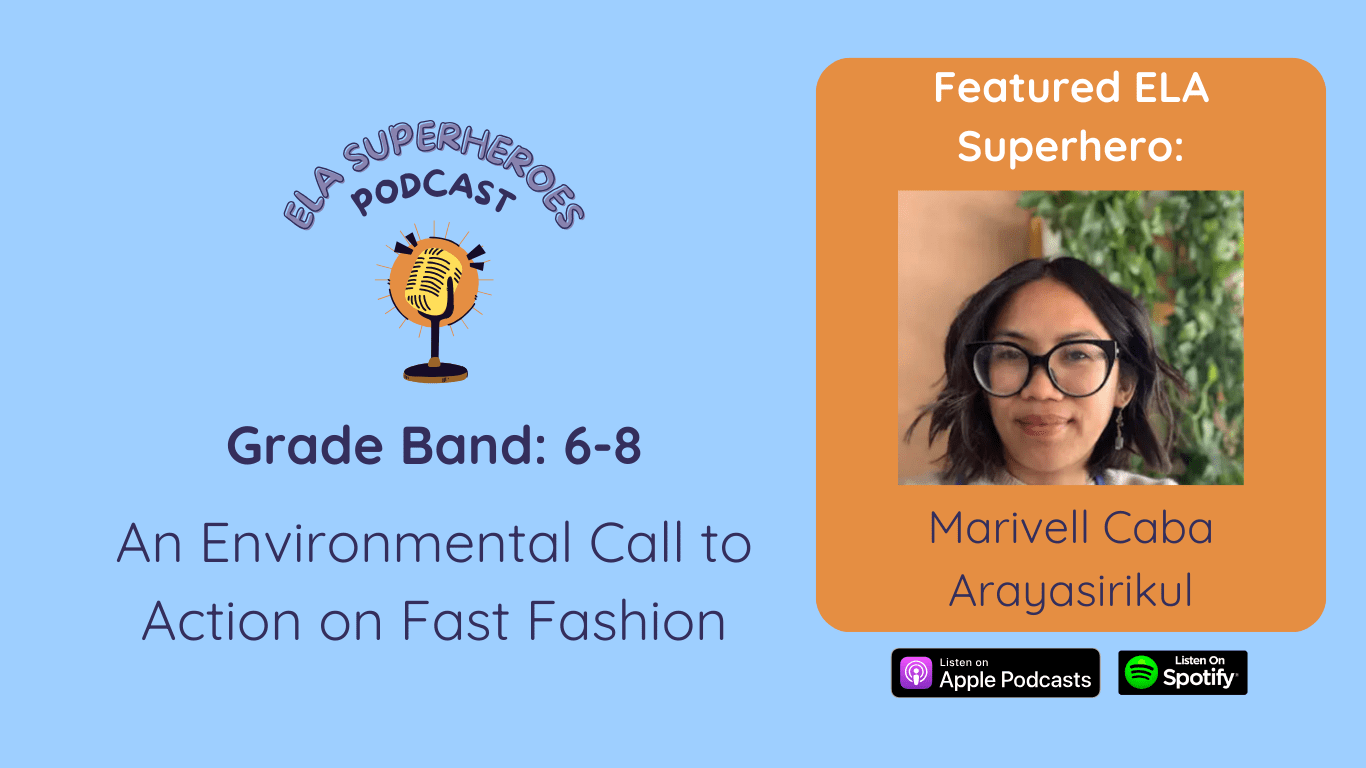
“Wherever I’m at, I want to contribute. I want to participate in this conversation.”
Marivell Arayasirikul
This podcast showcases an interdisciplinary argumentative reading, writing, listening, and speaking unit that asks students to grapple with who should take responsibility for corporate environmental degradation, specifically in the “fast fashion” shoes and jeans industries. Students engage with various texts and use those texts to formulate verbal and written arguments about a high-interest topic. At the end of the unit, students create a social media reel ecological call-to-action using Canva.
Featured ELA Superheroes:
- Marivell Caba Arayasirikul (she/her)

“How can I contribute to an overall environmentally just world?”
August Freas
Grade Band: 9-12
Empowering Student Action with Speculative Environmental Fiction
This place-based, interdisciplinary high school climate justice speculative fiction writing unit asks students to bring in an imaginative lens to address environmental racism and the climate crisis. For this unit, August collaborates with a World History teacher to integrate various writing genres to help students civically and creatively engage with climate solutions.
Featured ELA Superheroes:
- August Freas (they/them)
